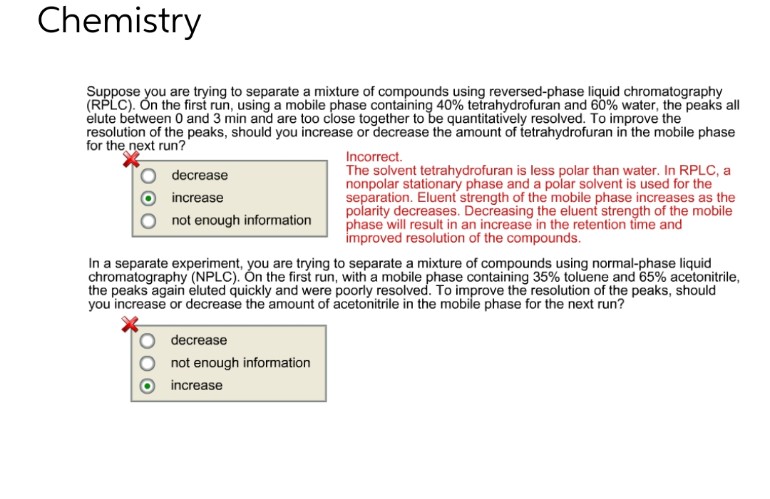Suppose you are trying to separate a mixture of compounds using reversed-phase liquid chromatography (RPLC). On the first run, using a mobile phase containing 40% tetrahydrofuran and 60% water, the peaks all elute between 0 and 3 min and are too close together to be quantitatively resolved. To improve the resolution of the peaks, should you increase or decrease the amount of tetrahydrofuran in the mobile phase for the next run? Incorrect. decrease increase The solvent tetrahydrofuran is less polar than water. In RPLC, a nonpolar stationary phase and a polar solvent is used for the separation. Eluent strength of the mobile phase increases as the polarity decreases. Decreasing the eluent strength of the mobile phase will result in an increase in the retention time and improved resolution of the compounds. not enough information In a separate experiment, you are trying to separate a mixture of compounds using normal-phase liquid chromatography (NPLC). On the first run, with a mobile phase containing 35% toluene and 65% acetonitrile, the peaks again eluted quickly and were poorly resolved. To improve the resolution of the peaks, should you increase or decrease the amount of acetonitrile in the mobile phase for the next run? decrease not enough information increase
Suppose you are trying to separate a mixture of compounds using reversed-phase liquid chromatography (RPLC). On the first run, using a mobile phase containing 40% tetrahydrofuran and 60% water, the peaks all elute between 0 and 3 min and are too close together to be quantitatively resolved. To improve the resolution of the peaks, should you increase or decrease the amount of tetrahydrofuran in the mobile phase for the next run? Incorrect. decrease increase The solvent tetrahydrofuran is less polar than water. In RPLC, a nonpolar stationary phase and a polar solvent is used for the separation. Eluent strength of the mobile phase increases as the polarity decreases. Decreasing the eluent strength of the mobile phase will result in an increase in the retention time and improved resolution of the compounds. not enough information In a separate experiment, you are trying to separate a mixture of compounds using normal-phase liquid chromatography (NPLC). On the first run, with a mobile phase containing 35% toluene and 65% acetonitrile, the peaks again eluted quickly and were poorly resolved. To improve the resolution of the peaks, should you increase or decrease the amount of acetonitrile in the mobile phase for the next run? decrease not enough information increase
Chapter4: Least-squares And Calibration Methods
Section: Chapter Questions
Problem 3P
Related questions
Question

Transcribed Image Text:Chemistry
Suppose you are trying to separate a mixture of compounds using reversed-phase liquid chromatography
(RPLC). On the first run, using a mobile phase containing 40% tetrahydrofuran and 60% water, the peaks all
elute between 0 and 3 min and are too close together to be quantitatively resolved. To improve the
resolution of the peaks, should you increase or decrease the amount of tetrahydrofuran in the mobile phase
for the next run?
Incorrect.
decrease
increase
The solvent tetrahydrofuran is less polar than water. In RPLC, a
nonpolar stationary phase and a polar solvent is used for the
separation. Eluent strength of the mobile phase increases as the
polarity decreases. Decreasing the eluent strength of the mobile
phase will result in an increase in the retention time and
improved resolution of the compounds.
not enough information
In a separate experiment, you are trying to separate a mixture of compounds using normal-phase liquid
chromatography (NPLC). On the first run, with a mobile phase containing 35% toluene and 65% acetonitrile,
the peaks again eluted quickly and were poorly resolved. To improve the resolution of the peaks, should
you increase or decrease the amount of acetonitrile in the mobile phase for the next run?
decrease
not enough information
increase
Expert Solution
This question has been solved!
Explore an expertly crafted, step-by-step solution for a thorough understanding of key concepts.
This is a popular solution!
Trending now
This is a popular solution!
Step by step
Solved in 2 steps

Knowledge Booster
Learn more about
Need a deep-dive on the concept behind this application? Look no further. Learn more about this topic, chemistry and related others by exploring similar questions and additional content below.Recommended textbooks for you


Principles of Instrumental Analysis
Chemistry
ISBN:
9781305577213
Author:
Douglas A. Skoog, F. James Holler, Stanley R. Crouch
Publisher:
Cengage Learning

EBK A SMALL SCALE APPROACH TO ORGANIC L
Chemistry
ISBN:
9781305446021
Author:
Lampman
Publisher:
CENGAGE LEARNING - CONSIGNMENT


Principles of Instrumental Analysis
Chemistry
ISBN:
9781305577213
Author:
Douglas A. Skoog, F. James Holler, Stanley R. Crouch
Publisher:
Cengage Learning

EBK A SMALL SCALE APPROACH TO ORGANIC L
Chemistry
ISBN:
9781305446021
Author:
Lampman
Publisher:
CENGAGE LEARNING - CONSIGNMENT
